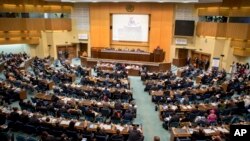An agreement has been reached on a global financial structure to meet new United Nations development goals, but civil society organizations say it does not include mechanisms to reign in corporate tax dodgers.
A four-day United Nations conference in Ethiopia reached an agreement on a financial framework for the Sustainable Development Goals, the successor of the Millennium Development Goals. But the new framework does not include a U.N. Global Tax Body.
Wu Hongbo is the U.N. Under Secretary-General for Economic and Social Affairs. He said the agreement would be a strong foundation for implementing sustainable goals.
Hongbo said that the agreement at the moment was the best they could get, despite it not including a global tax body.
“I am aware there are quite a few reports about discussion about taxation issues. All the member states are fully aware the importance of taxation and the taxing system. They all agree that international efforts should be strengthened in terms of taxation and related matters. I would also like to say this is not the end of the journey. The member states will continue. This is a gradual process,” he said.
Taxation was a major part of discussions. Stronger taxation authority in developing countries could raise huge amounts of money and stop tax avoidance by international corporations.
The European Union, United States and other rich countries mostly opposed creation of a global tax body as part of the agreement.
Alvin Mosioma is the Executive Director of Tax Justice Network Africa. He said there were a number of elements in the agreement that civil society organizations welcome but that without a global tax authority, the deal was not as ambitious as hoped.
“I think that developing countries were arm-twisted by the rich countries to agree to a compromised document. I think that vested interests prevailed, the interests of the rich particularly,” said Mosioma.
The agreement reached in Ethiopia this week features a set of policy actions and initiatives. One is setting up a Global Infrastructure Forum to identify infrastructure gaps.
While the U.N. calls the deal “historic” and “groundbreaking,” some of the agreed upon points are very similar to those of 15 years ago. One of the outcomes is for countries to recommit to spend seven-tenths of one percent on foreign aid.








